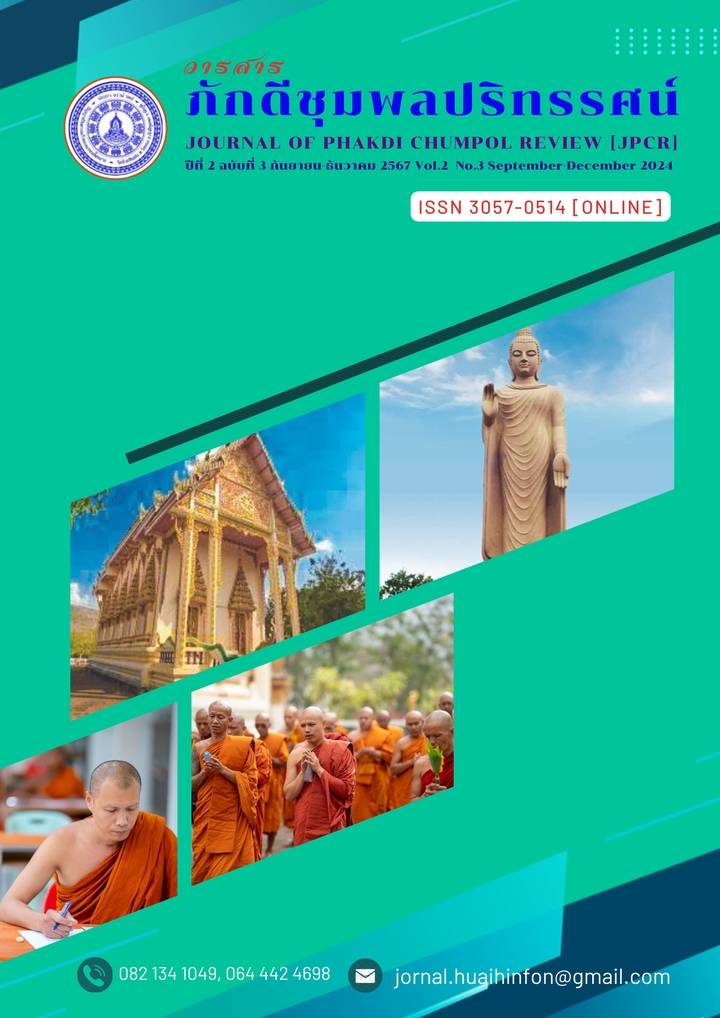Political culture of the people in a democratic System with the King as Head of State.
Keywords:
Political Culture, Population, DemocracyAbstract
This article aims to study the political culture of people in a democratic regime with the King as Head of State. It was found that: Thailand has a democratic government with the King as Head of State. The word “democracy” which means “the people are supreme” is the fact that the people have sovereignty or have the highest power to govern the country. Currently, the Constitution of the Kingdom of Thailand, B.E. 2017, in democratic governance, the important thing is "the people" and the perfection of democracy is That the people can come in and have a voice in governance However, due to many limitations, such as having too large a population to directly participate in political activities. Therefore, political participation of citizens is considered an important role, especially in democratic elections.
The political culture of the people in a democratic regime with the King as Head of State can be summarized in 3 aspects: 1) a narrow political culture means that people think that expressing political opinions is useless. And people think that Thai politics is full of chaos Following the news is a waste of time. 2) Prai Fa political culture, meaning people have political rights but do not want to get involved in politics. And people have political rights, but they alone cannot change politics. Obey the law even if you feel the law is unfair. 3) Participatory political culture: people participate in the Thai political system. Your own voice is important in politics. They think they have the ability to investigate politicians.
References
มหาจุฬาลงกรณราชวิทยาลัย. (2539). พระไตรปิฎกภาษาไทย ฉบับมหาจุฬาลงกรณราชวิทยาลัย. กรุงเทพมหานคร : โรงพิมพ์มหาจุฬาลงกรณราชวิทยาลัย.
กมล สมวิเชียร. (2514). วัฒนธรรมการเมืองไทยกับการพัฒนาการเมือง. ในวรรณไวทยากร: รัฐศาสตร์. กรุงเทพมหานคร : ไทยวัฒนาพานิช.
จรูญ สุภาพ. (2522). หลักรัฐศาสตร์. ฉบับปรับปรุงแก้ไขใหม่ครั้งที่ 2. กรุงเทพมหานคร : โรงพิมพ์วัฒนาพานิช.
จิรพันธุ์ วิสูตรศักดิ์. (2547). “การดำเนินงานตามบทบาทขององค์การบริการส่วนตำบลหนองสาหร่ายอำเภอปากช่องจังหวัดนครราชสีมาในการมีส่วนร่วมทางการเมืองของประชาชนในท้องถิ่น”. วิทยานิพนธ์รัฐศาสตรมหาบัณฑิต. บัณฑิตวิทยาลัย : มหาสารคาม.
ณัชชาภัทร อุ่นตรงจิตร. (2563). รัฐศาสตร์. พิมพ์ครั้งที่ 16. กรุงเทพมหานคร : จุฬาลงกรณ์มหาวิทยาลัย.
นิมิต ไชยรัตน์. (2551). “การมีส่วนร่วมของประชาชนที่มีต่อการปกครองส่วนท้องถิ่น : ศึกษาเฉพาะกรณีองค์การบริหารส่วนตำบลบางคูรัด อำเภอบางบัวทอง จังหวัดนนทบุรี”. สารนิพนธ์
ศาสนศาสตรมหาบัณฑิต. บัณฑิตวิทยาลัย : มหาวิทยาลัยมหามกุฏราชวิทยาลัย.
พจนานุกรมพจนานุกรมฉบับเฉลิมพระเกียรติ 2556. (2556). พจนานุกรมฉบับเฉลิมพระเกียรติ พ.ศ. 2556. พิมพ์ครั้งที่ 32. กรุงเทพมหานคร : สำนักพิมพ์วัฒนาพานิช.
“รัฐธรรมนูญแห่งราชอาณาจักรไทย พุทธศักราช 2560”. (2560). ราชกิจจานุเบกษา เล่ม 134 ตอนที่ 40 ก. 6 เมษายน.
ศันสนีย์ ตันติวิท. (2550). “การท่องเที่ยวเชิงนิเวศ (Eco-Tourism) กรณีศึกษาการมีส่วนร่วมของชุมชนเกาะล้านต่อท้องถิ่น”. วารสารวิทยาศาสตร์และเทคโนโลยี. ปีที่ 5 ฉบับที่ 1 กันยายน-ธันวาคม.
อภิชญา พรรณศรี. (2561). ความรู้เบื้องต้นทางรัฐศาสตร์. มหาสารคาม : เดอะปริ้นท์.
Gabriel A. Almond and Sidney Verba. (1965). The Civic Political Attitudes and Democracy in Five Nations. Boston: Little Brown.




